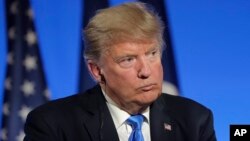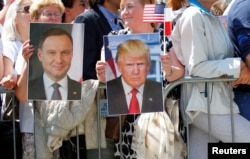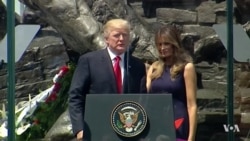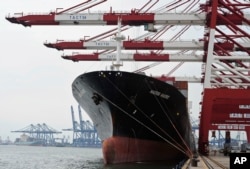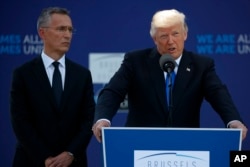Six months into his presidency, Donald Trump has a mixed record on his pledges to reverse much of his predecessor's foreign policy legacy.
Trump has withdrawn from the Paris climate accord, pulled out of the Trans-Pacific Partnership trade pact and vocally supported improving relations with Russia.
The president, for now, is sticking with the Obama administration's Iran nuclear deal, and he appears to be maintaining the limited U.S. military involvement in Syria, Afghanistan and Iraq.
When he speaks in public, however, there is no confusing Trump with his predecessor.
In a speech to cheering Poles in Warsaw this month, Trump distanced himself from Barack Obama's multilateral diplomacy. He strongly defended Western values, which he said are increasingly threatened by terrorism from those who do not share them, and by complacency from those who do.
"Do we have the desire and the courage to preserve our civilization in the face of those who would subvert and destroy it?" he asked.
Trump also used the Warsaw speech to answer critics who have accused him of being soft on Russia at a time intelligence agencies are saying the Kremlin meddled in U.S. elections on his behalf. He warned Moscow against aggressive behavior.
"We urge Russia to cease its destabilizing activities in the Ukraine and elsewhere and its support for hostile regimes, including Syria and Iran, and instead join the community of responsible nations in our fight against common enemies in defense of civilization itself," Trump said.
Unpredictable partner
Many policy analysts, however, say Trump has proven to be an unpredictable partner, weakening the trust of longtime allies and effectively jeopardizing America's traditional role as a global leader.
"There are deep-seated questions about American values and about where this administration is going," said Charles Kupchan, senior fellow at the New York-based Council on Foreign Relations who served in the Clinton and Obama administrations.
Watch: Despite Rhetoric, Trump's Foreign Policy Hews Close to Obama's
"If it heads in a very nationalist and a very populist direction, four years from now we could see a very serious erosion in the trust, the confidence — the stickiness, if you will — of the relationships in the institutions that have kept the international order in a stable fashion," Kupchan said.
Perhaps Trump's two biggest breaks from Obama have been in withdrawing from the Trans-Pacific Partnership, which already faced on uncertain fate in Congress, and withdrawing from the Paris climate agreement, which sparked outrage at home and abroad.
At a summit for leaders of the Group of 20 leading industrialized nations in Germany this month, Trump's pullout from the Paris accord earned him a stern rebuke from all 19 other participants.
"In the end, the negotiations on climate reflect dissent, all against the United States of America," said German Chancellor Angela Merkel, the summit host.
Clearly stung by the unanimity of the opposition, Trump suggested he might change his mind. "Something could happen with respect to the Paris accord," he said at a news conference last week with French President Emmanuel Macron. "We'll see what happens."
Advantage to China
Kupchan said the biggest beneficiary of Trump's go-it alone, "America First" approach might be China, the chief U.S. rival on the world stage.
"The president pulled down the Trans-Pacific Partnership, which was a U.S.-led effort to create a trading zone, and he backed out of the Paris climate agreement," Kupchan said. "Both of those moves have sort of handed on a silver platter global leadership to China."
Another area where Trump has deviated from Obama has been the Middle East. His first overseas trip was to Saudi Arabia, where leaders of more than 50 Muslim countries applauded his grand plan to organize a coalition to fight Islamist radicals. That idea has since run aground on the rocks of an internecine squabble among regional adversaries, setting off a fresh wave of instability in the Gulf. And unlike Obama, Trump ordered a military strike on Syrian government forces deemed responsible for a chemical weapons attack on civilians.
On other issues, however, Trump's policies have been surprisingly close to his predecessor's, even in cases where he ridiculed Obama's actions.
After repeatedly pledging to tear up the nuclear agreement Obama signed with Iran, saying he thought it was a bad deal, he agreed this week to certify Iran's compliance for another three months, at least temporarily keeping the accord in place.
Experts point to a number of factors that have contributed to tempering Trump's impulsive instincts toward more Obama-like positions. Regarding Iran, it was his foreign policy team of cooler heads; on his travel ban, it has been the courts restraining and limiting his executive order; and on his plan to compel North Korea to give up its nuclear ambitions, it was simply coming to the realization that, like Obama, he has no good options.
'Constraints' encountered
Reva Goujon, vice president for Global Analysis at the Texas-based Stratfor research group, said Trump is learning that on many international issues, there's little room to maneuver.
"In many respects, the Trump foreign policy record has been largely predictable, and that's because there are constraints embedded in the international system and on the United States that he is responding to," Goujon told VOA.
Douglas Feith, former undersecretary of defense in the George W. Bush administration and now a senior fellow at the Hudson Institute, a Washington think tank, told VOA the presidency has its own way of moderating a candidate's campaign rhetoric.
"He made a number of statements in the campaign that were pretty radical, saying the kinds of things that American political leaders generally don't say or haven't said about, in particular, about our alliances, about NATO, our alliance with South Korea and Japan, for example," Feith said. "But as president I think he's gone a long way toward reassuring the allies that we're going to have a much more conventional approach."




